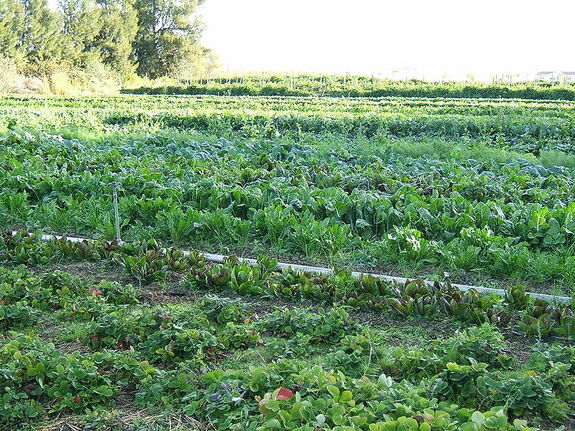
Let's Not 'Feed The World': Moving Beyond an Unhelpful Phrase (Op-Ed)

Margaret Mellon is a senior scientist for food and the environment at the Union of Concerned Scientists (UCS). She is a leading expert on sustainable agriculture and the potential environmental risks of biotechnology, holding a doctorate in molecular biology and a law degree. This Op-Ed was adapted from a post to the UCS blog The Equation. She contributed this article to Live Science's Expert Voices: Op-Ed & Insights.
After years of participation in public discussions about agriculture, I've developed something of an allergy to the catchphrase "feed the world."
It seems to come up with depressing regularity to justify, among other things, pesticides, industrial-scale monoculture and biotechnology, all of which we must embrace — all together now — to feed the world. What gets under my skin is that the phrase is so often used by advocates of high-input American corn and soybeans, individuals who otherwise seem not terribly concerned about the problems of hungry people or farmers in developing countries.
A recent example is Farmers Feeding the World, an industry-wide campaign that "educates the general public about U.S. agriculture's role in feeding a hungry world." The fact that the campaign funnels money into worthy organizations doesn't obscure its focus on "the unique interests of people and organizations aligned with U.S. agriculture."
But feeding the world doesn't have much currency among those dedicated full-time to fighting hunger.
The hunger organization Bread for Word talks not of how U.S. agriculture will feed the world, but of agricultural development for small-scale producers and women, improving nutrition for women and young children, and ensuring that efforts are "country-led"— meaning the communities, constituencies and countries affected by hunger are setting priorities.
The ambitious U.S. initiative called Feed the Future does not use the phrase either but instead talks about "supporting countries in developing their own agricultural sectors to generate opportunities for economic growth that can help reduce poverty and hunger."
Get the world’s most fascinating discoveries delivered straight to your inbox.
Likewise, the recent Food and Agriculture Organization of the United Nations (FAO) report on world agriculture and malnutrition, "The State of Food and Agriculture: Food Systems for Better Nutrition,"doesn't use the term "feeding the world." FAO would eradicate malnutrition by integrating agriculture into local and regional food systems, "from inputs and production, through processing, storage, transport, and retailing, to consumption."
Maybe the phrase is falling from favor. I, for one, would welcome its retirement.
The term has enjoyed a long run. It gets almost 2 billion hits when I Googled it. Some of those hits relate to Bob Geldof's 1984 Band-Aid concert, but most are about U.S. crops — more precisely, the export crops soybean and corn. The phrase got a big boost in the 1970s when then-Secretary of the U.S. Department of Agriculture, Earl Butz, used it to advocate for fence-row-to-fence-row agriculture. He knew that new uses for crops and increased exports would be necessary to absorb all that production without lowering prices. "Feed the world" became a rallying cry for export-oriented agricultural policy. (It still is, despite the fact that almost 40 percent of U.S. corn acreage is devoted to producing ethanol.)
One reason the phrase is so favored is because feeding is an essential and benevolent activity that conjures comfortable memories of preparing, serving and enjoying meals. To satisfy this basic need for the whole world is a noble endeavor. And, of course, there are grains of truth here. U.S. farmers can feel good that they are helping to meet the food needs of those who can afford to buy their products.
But the phrase conflates the important issues of food production and hunger alleviation. It implies that producing corn and soybeans is the equivalent of putting food into the mouths of hungry people. But there is no direct connection between U.S. corn and soy production and ending hunger elsewhere (or for that matter in the United States). In fact, the truth is that high production in the United States can depress world grain prices and throw developing-country farmers off the land.
It is time to separate the issues of hunger alleviation and crop production.
Despite decades of surplus commodity-crop production, world hunger has been, and remains, an acute problem. In its recent report, FAO estimates that 868 million people (12.5 percent of the world population) are undernourished in terms of energy intake. (That's only a part of the hunger problem. The full global burden of malnutrition would include 26 percent of the world's children whose growth is stunted, 2 billion people suffering from one or more micronutrient deficiencies and 500 million people who are obese.)
Simply increasing U.S. crop production won't help feed those people because insufficient production — and certainly insufficient production in the developed world — is not the heart of the problem. Many issues beyond production need to be addressed and most of the effort needs to be directed to the developing world. Tackling issues like infrastructure, transport, storage, prices and the role of women in an integrated way — as both the FAO and the Feed the Future initiatives do — is the only serious approach to the world hunger problem.
Implying that U.S. grain exports can alleviate hunger by feeding the world distracts from that key understanding.
U.S. export policy should be addressed on its own terms, primarily as an economic issue rather than a humanitarian enterprise. Hungry people should not be the poster-children for the interests of the well-fed.
People who care most about developing-nation agriculture don't use the phrase "feeding the world." Those interested in corn and soybean exports should drop it as well.
If we need a catchphrase for world hunger issues, we could consider "helping the world feed itself." I know, it doesn't exactly sing, but it will help us focus on genuine solutions to vital global problems.
This article was adapted from the post "Let's Drop 'Feed The World': A Plea To Move Beyond an Unhelpful Phrase" on the UCS blog The Equation. The views expressed are those of the author and do not necessarily reflect the views of the publisher. This version of the article was originally published on Live Science.
